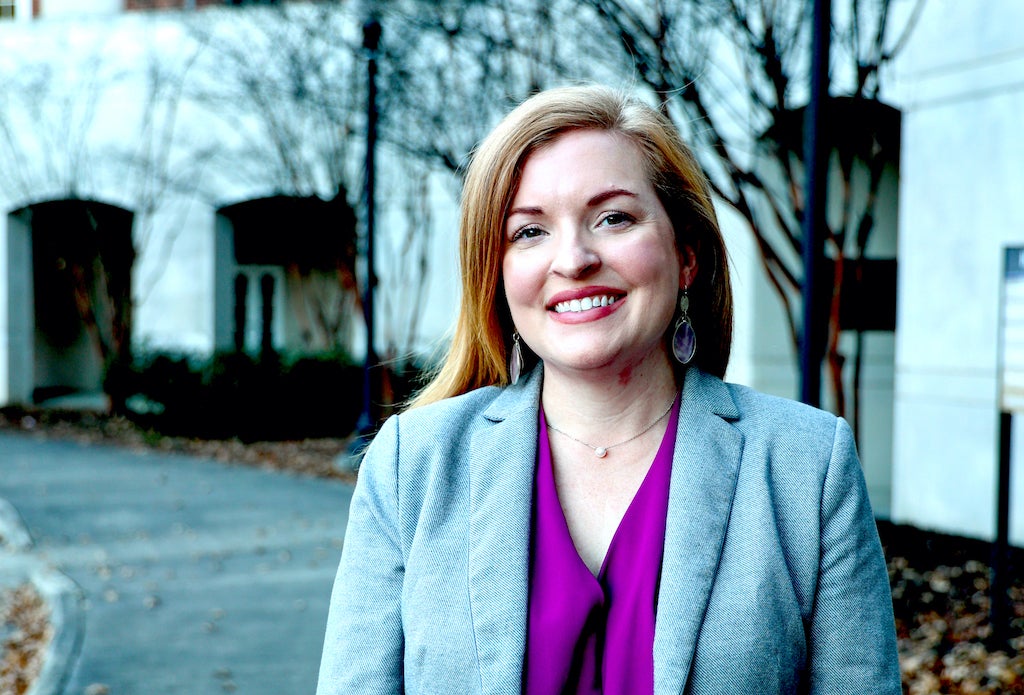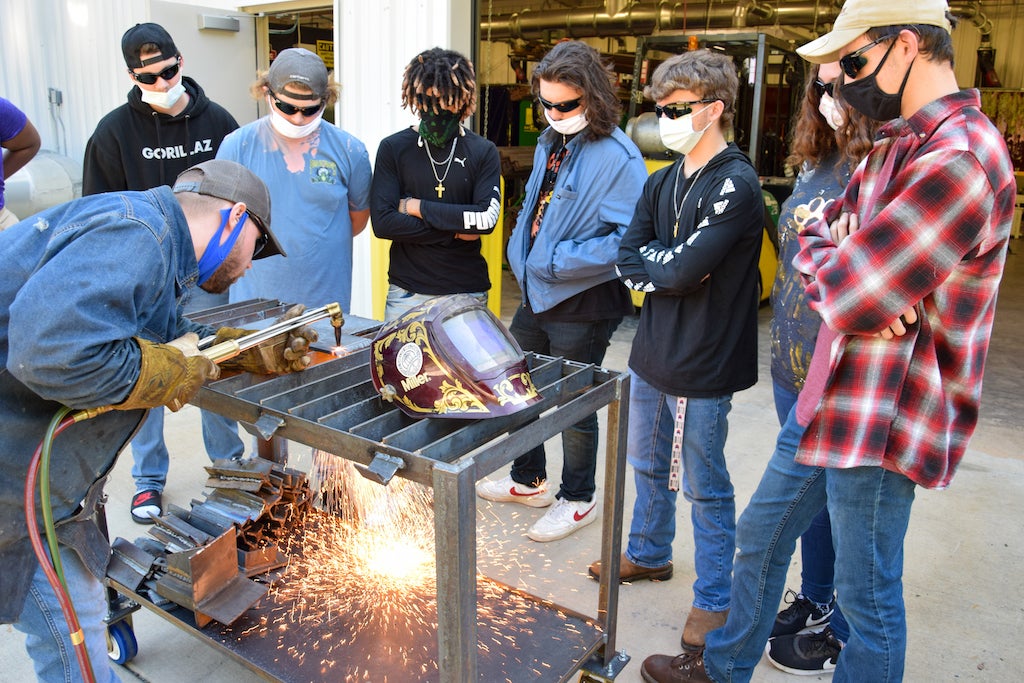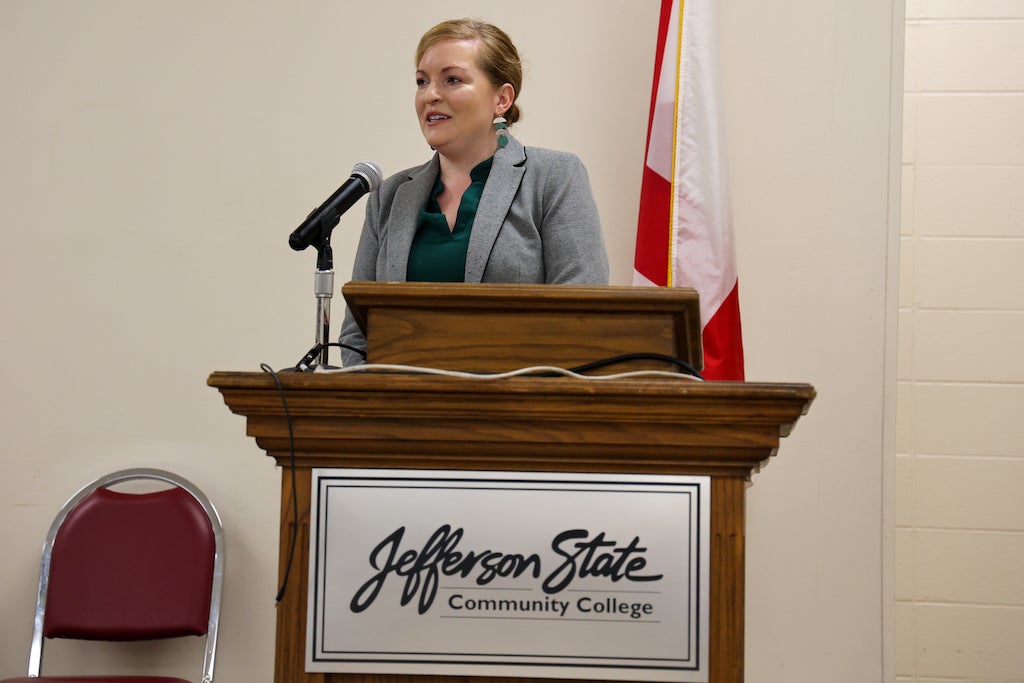PROFILE: Connecting people with careers: Jeff State’s Leah Bigbee is resolute in her mission to fuel the local workforce
Published 1:44 pm Thursday, March 21, 2024

- Jefferson State Community College's Leah Bigbee is resolute in her mission to fuel the local workforce. (For the Reporter/Stephen Dawkins)
|
Getting your Trinity Audio player ready...
|
By STEPHEN DAWKINS | Special to the Reporter
Charity Ivie was getting her life back on track. She completed the program at the Lovelady Center, a faith-based organization that helps women who have been through the criminal justice system to transition back into productive lives. But then what? She still needed a job to properly care for her family.
Ivie enrolled in the Heavy Equipment Operator program at Jefferson State Community College—even being chosen as the Go Build Alabama Student of the Month in fall of 2022. She eventually secured a job with Dunn Construction.
Leah Bigbee, dean of workforce education at JSCC, said she frequently thinks about Ivie as an example of the source of motivation in her position, addressing workforce needs and connecting people with careers.
“We have many stories like hers, people having the courage to go through challenging times and then making the most out of their situation by completing one of our programs and going on and getting a job,” Bigbee said.
Alabama Gov. Kay Ivey in 2018 announced a goal for the state to add half a million skilled employees to its workforce by 2025, and the COVID pandemic emphasized the need for workforce development through supply chain issues and more.
Bigbee, along with her department at Jefferson State and others in similar positions across the state, will be critical to meeting Ivey’s goal and boosting Alabama’s economy. “A lot of our programs at the college, someone may have never gone to college or maybe they just got their GED a couple of years ago and now they can go through one of our programs,” Bigbee said. “There’s a lot of pride in the fact that they’ve been able to do a fast-track program and successfully complete a skills training program since these programs require skills. When the students finish the program and their kids are at their graduation, creating that culture of, ‘Hey, I can change my life with this training,’ that’s a really special thing to be a part of.”

A foundation in workforce training
Bigbee, a native of Fairhope, earned undergraduate and master’s degrees from UAB and then worked at the university for five years in corporate engagement, connecting companies that were hiring with students. “Everyone thought I was crazy for leaving UAB because it was a great job, but there was something really appealing about getting into workforce development and serving the community in that capacity,” she said.
After UAB, Bigbee worked for Generation USA, a workforce development nonprofit in Washington, D.C. The organization partnered on a Department of Labor grant with Jefferson State. Bigbee also served through AmeriCorps with Positive Maturity, a nonprofit in Birmingham. Her duties included job coaching and resume building for older adults looking for work.
“I absolutely got the bug for serving others and connecting people with careers, and it kind of all started there and led me ultimately to Jeff State,” Bigbee said. “By working for [Generation USA], I kind of fell into the community college system and working for Jeff State, and I’ve absolutely loved it ever since.”
Bigbee was hired as director of workforce education at Jefferson State in 2019. “It was just an incredible opportunity to come into. I had so much to learn about the community college system. Community colleges are so different than any other educational institution. I came into a great team and just tried to meet with my colleagues and listen and soak up everything and ask questions, and connect with companies and nonprofits and community members.”
Colleges have historically had noncredit departments but were not known for focusing on industry needs or being responsive to local workforce pools. Bigbee said she thinks a deficit in skilled workers has propelled community colleges forward as engines for economic change.
“We can be adaptable; we can be responsive. We have the flexibility to create programs and to answer those needs. Over the last several years, especially since the pandemic, we’re hungry for those roles and we’re placing more value on the truck drivers, the HVAC technicians, the phlebotomists, the medical assistants of the world. The tide is really turning, and we’re saying that we’ve got to invest in these types of trainings and we’ve got to make sure that our adults that aren’t active in the workforce know about the trainings and that they provide great careers and that our students graduating from high school know that this is a great option—that a traditional four-year educational career path is not the only option.”
In Bigbee’s four years in her position, JSCC has added 15 new programs and doubled enrollment in fast-track programs. Examples include a lineworker program in partnership with Alabama Power and a heavy equipment operator program in conjunction with Dunn Construction. Then there are collaborations such as one with Ascension St. Vincent’s, The Women’s Foundation of Alabama, and Childcare Resources. The organizations’ work together produced the opening of a new workforce training facility in downtown Birmingham. There, women receive training focused on entry-level roles at St. Vincent’s and other healthcare partners while childcare is provided on-site.
“The community is hungry for what we’re doing, and the Workforce Education Department—we have unique value because we can be very flexible to companies’ needs. No matter who you are or where you came from or what zip code you’re in, and the fact that we can contribute to that and to give people access to that is important and it’s powerful.”
Partnerships with local business and industry
Jefferson State’s approach to curriculum and adding new programs under its fast-track umbrella is centered on industry needs and labor market data, Bigbee said. Recent additions have seen overwhelming interest. For example, the CDL program has had thousands of people express interest in about one year.
“Our president, Keith Brown, is very innovative and responsive to business and industry,” she said. “Under his leadership, we’ve created programs that are employer-led and that lead to high demand careers and provide livable wages. We rely on companies for so many things, from advisory boards to sending us their retired workers to teach our classes, to coming to speak to our classes, to providing work-based learning opportunities, to co-creating our curriculum with other companies. Of course, interviewing our students and hiring our students is paramount. But we couldn’t do what we do without the support of our industry partners across sectors. And, you know, they’re really our North star in a lot of ways with what we do with skills training at the college. We’re never going to do a program that doesn’t have a company partner and that doesn’t lead to a valuable, high-demand, livable-wage career.”
Bigbee and JSCC representatives also rely on chambers of commerce, workforce councils and workforce associations, like the Alabama Trucking Association.
Demand from local employers was the driving factor behind the opening of the Welding Center on Jefferson State’s Shelby-Hoover Campus in 2020. Instructor Brody Scott has guided the center from its initial class of six students to its current constant buzz of activity. There are more than 60 students in welding classes at the Shelby-Hoover Campus and an overwhelming majority will find good-paying jobs after graduation. In fact, a new apprenticeship program has allowed students to begin working at about five different local companies even while they are still in school.
“For me, it’s about watching people grow and develop skills that are going to provide for them and their families,” Scott said.
Britney McClung, coordinator of career programs in the JSCC Center for Workforce Education, said the department employs about 60 part-time instructors to teach about 30 career programs. Health care related programs make up about a third of the total number of offerings. The instructors are held to Jefferson State’s high academic standards. “Not only do they have to be subject matter experts and know the curriculum and the certification and the career, but they really have to be passionate about training others,” McClung said.
A challenge for the department is that because the courses are “non-credit,” federal funding in the form of Pell Grants is not available. So other grants and funding from industry partners are critical, especially for new programs. “It’s easier to get a program off the ground when you can recruit students and they don’t have to worry about finances,” McClung said. As an example, the lineworker program started in 2021 benefited from a grant from the Appalachian Regional Commission that provided scholarships for all participants.

Supporting students on their educational journey
If industry is half of the equation, students represent the other half. Jefferson State offers one-on-one career coaching and a variety of other wraparound support services. Also critical to Bigbee’s department is the new Regions Student Success Center. There, students in need can access mental health services, a food pantry, and apply for emergency grants.
“The stories that really stick with you are the students that come us with their head in their hands, needing some support,” Bigbee said. “We’re able to wrap our arms around them and give them some resources. Then they were able to continue and complete the program and go get a great job. Jeff State is unique because we know that the student is not just a student; we know that a student has a life. We serve a lot of students that are parents, maybe they’re caring for their children and they’re caring for their aging parents and working a job, too. We know that we have to have the mindset when someone comes through our doors, to make sure students know we see them as a whole person and we know that there are other needs that they have beside just making it to class on time and completing their homework.”
The average age of students in Jefferson State’s fast-track courses is 32, compared to an average student age of 23 in other areas. So, Bigbee’s courses target adults who want to up-skill, change careers, or even people that need to hit the reset button on their direction in life.
“You can always consider a new career or turn over a new leaf, and Jeff State can be that place for someone,” Bigbee said. “At the end of the day, everybody wants to provide for their family, and workforce education is a way for them to do that. I just think it’s life-changing, what we’re able to do.”









